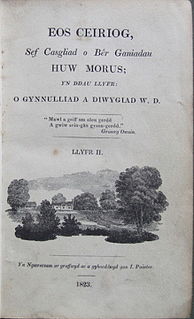Gwerful Mechain, is the only female medieval Welsh poet from whom a substantial body of work is known to have survived. She is known for her erotic poetry, in which she praised the vulva among other things.
Gwilym ab Ieuan Hen was a Welsh language poet during the time of the Beirdd yr Uchelwyr, the professional "Poets of the Nobility".
Dafydd Llwyd ap Llywelyn ap Gruffudd, usually referred to as Dafydd Llwyd o Fathafarn was a Welsh language poet, a native of Mathafarn, Powys.
Sir Gruffudd Vychan was a Welsh knight who supported the rebellion of Owain Glyndŵr against the English, captured the Lollard John Oldcastle and was finally executed after the murder of Sir Christopher Talbot.
Martha Llwyd, born Martha Williams, was a Welsh poet and Methodist hymnwriter. Due to health problems, Llwyd was unable to walk. She was carried aloft in her chair.

Huw Morus or Morys, also known by his bardic name Eos Ceiriog, was a Welsh poet of the 17th century. One of the most popular and prolific poets of his time, he composed a large number of poems in a variety of metres. Morus's work bridges the gap between the strict-metre tradition of the Beirdd y Uchelwyr and popular verse.
Ieuan ab Rhydderch ab Ieuan Llwyd was a Welsh bard.
Alis ferch Gruffudd ab Ieuan ap Llywelyn Fychan or Alis Wen was a 16th-century poet who wrote in Welsh. She wrote several englynion on matters of her personal and family life, and a cywydd aimed at reconciling two men.
Bedo Hafesp was a Welsh poet from Montgomeryshire.
Siôn Dafydd Rhys, in Latin Joannes David Rhaesus, also called John David Rhys, or John Davies, was a Welsh physician and grammarian. He wrote the first Welsh grammar in Latin, published in 1592.
Matthew Brwmffild was a Welsh poet. He is believed to have been from the Maelor area.
Dafydd ap Ieuan Llwyd was a Welsh poet. He was from the Aberhafesp area of Montgomeryshire.
Dafydd ap Maredudd ab Ednyfed was a 15th century Welsh poet. He may have written a cywydd in 1460 when Richard, Duke of York, returned from Ireland to start his new campaign against Henry VI, and hastily summoned Parliament later that year. It is often attributed to him, although elsewhere the same poem is attributed to Dafydd Llwyd ap Llywelyn ap Gruffudd or to Llywelyn ab Ednyfed alias Llywelyn ap Maredudd ab Ednyfed.
David (Dafydd) Daron was the Dean of Bangor. His father was Evan ap David ap Griffith, a descendant of Caradoc ap Iestyn.
Dafydd Llwyd ap Dafydd ab Einion ap Hywel was a prominent Welsh patron of the bards. He was a descendant of Elstan Glodrydd. His generosity towards the bards, and as an entertainer was acknowledged by the likes of Lewis Glyn Cothi, Guto'r Glyn, and Llawdden. Hywel Swrdwal is thought to have been his household bard.
Dafydd Llwyd Mathau was a 17th-century Welsh poet and strolling minstrel. It was thought by the bibliographer John Humphreys Davies (1871–1926) that he may have been from the Llangeitho area of Ceredigion (Cardiganshire).
Dafydd Llwyd Sybylltir was a 17th-century Welsh poet, from the Sybylltir area of Anglesey. He is known to have composed a number of love poems, written in free metre.
Mathafarn is a house and farm near Llanwrin, in Wales. The earliest house here was built before 1485, and Mathafarn plays a significant role in Welsh and English history.
"The Poet and the Grey Friar" is a satirical poem in the form of a traethodl by the 14th-century Welsh poet Dafydd ap Gwilym, widely seen as the greatest of the Welsh-language poets. In it he relates an imaginary conversation with a Franciscan friar in which, rejecting the ascetic philosophy of the friar, he sets out a defence of love, poetry and the worldly life. It was included in The Oxford Book of Welsh Verse and The Penguin Book of Welsh Verse.
